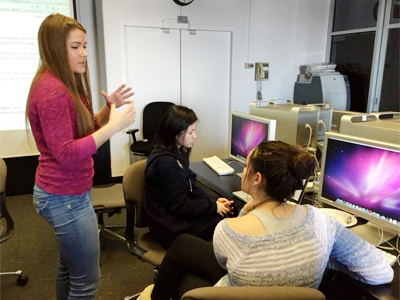Girls Who Mentor Girls Who Code
Young women from schools throughout the New York City area are learning fundamentals of computer science and laying the groundwork for potential careers in programming, thanks to Columbia Engineering’s new chapter of the national nonprofit organization Girls Who Code.

Columbia’s chapter was launched in February after computer science majors Jessica Grace Valarezo and Lauren O’Connor worked in the organization’s summer immersion program, which provided groups of 20 high school girls with seven weeks of intensive instruction and exposure to opportunities in programming and technology. Valarezo and O’Connor cofounded Columbia’s group with fellow SEAS student Deborah Altaras, Nicole Valencia from Columbia College, and Jackie Hall from Barnard.
Founded in spring 2012, Girls Who Code works toward gender parity in computing with a new model for computer science education for high school girls that combines rigorous instruction in mobile development, web design, and robotics with mentoring from college students and professionals in the field. “I really wish I had a resource like Girls Who Code when I was in high school,” Valarezo said. “Not only would it have motivated me to take my first computer science class earlier on in my college career, but it would have made me feel better equipped to grasp the foreign material.”
Approximately 15 girls recruited from local high schools assemble at Columbia Engineering’s Botwinick Multimedia Lab for two hours each Saturday morning for hands-on lessons involving a range of computer science challenges. At a March 28 session, attendees learned about the programming behind Internet search engines from Kristie Howard, a computer science major at the Engineering School, and worked to develop video games using Scratch, a free programming language that enables beginners to produce interactive media. Columbia volunteers, including SEAS student Aparajita Maitra, offered tips and helped the girls learn, they said, to see programs “from the perspective of the computer.”
The students who organized the Columbia chapter of Girls Who Code, coordinating with the School’s Outreach Programs, hope their work will help unleash the programming potential of women, who as of 2013 made up 26% of the workforce in computing fields.
“Starting early on, providing high school girls with mentorship and exposure, will help reduce the barriers for entry for women currently considering computer science,” said Valarezo. “It is incredibly motivating to see how much they are able to accomplish and how well prepared they will be to take on computer science in college.”
